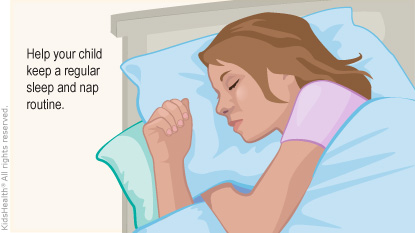Narcolepsy: How to Care for Your Child
Narcolepsy is a neurologic (brain) disorder that causes extreme sleepiness. Most kids with narcolepsy also have cataplexy (a temporary muscle weakness or loss of control during strong emotions like laughter, surprise, anger, or fear). They may have other symptoms too.
Narcolepsy is a lifelong condition that affects someone's home, school, and social life. Kids with the condition may struggle with behavior and learning problems, anxiety, and depression. They also might be heavier than other kids their age and go through puberty earlier.
There's no cure for narcolepsy, but taking medicines and creating healthy habits — like getting enough sleep, eating well, and getting plenty of physical activity — can help with many of its symptoms.


Follow your health care provider's recommendations for:
-
giving your child any prescribed medicines
-
whether it's OK to give your child medicines you can buy without a prescription (some can make narcolepsy symptoms worse)
-
activities your child may need to avoid (such as biking and driving)
Talk to school staff about:
-
any scheduled naps your child takes at school
-
things that may help your child stay alert during class, such as sitting in the front of the classroom, taking breaks to stand or go for a short walk, drinking cold water, or chewing gum
-
giving your child extra time during tests so they can take breaks to refresh
Help your child get enough sleep (at least 10 hours for grade-school kids and 8 hours for teens):
-
Schedule naps as needed.
-
Help your child keep the same sleep schedule every day.
-
Encourage your child to avoid caffeine (found in soda, coffee, tea, chocolate, and energy drinks).
-
Teach your child to avoid screen time (smartphones, computers, and TV) right before bed.
-
Keep screens out of your child's bedroom.
Support your child's overall well-being:
-
Help your child learn about narcolepsy. If they're interested, look for an online or in-person support group at:
-
Consider having your child talk to a counselor about healthy ways to cope.
-
Encourage your child to get physical activity every day. It helps them stay fit and can improve their mood and sleep too.
-
Talk to your child about the importance of avoiding alcohol, marijuana, and other drugs as these can make narcolepsy worse and interfere with some medicines.

Your child:
-
still has symptoms after following the health care provider's instructions
-
has behavior problems at home and/or school
-
has trouble learning
-
seems sad or stressed
-
is gaining a lot of weight or seems to be going through puberty earlier than their peers
-
snores a lot or seems to have gaps in breathing while sleeping

What causes narcolepsy? In narcolepsy, the sleep–wake cycle is abnormal. Doctors and scientists don't know why this happens. It could be a problem with the balance of some neurotransmitters (chemicals that send signals in the brain), which tell the brain when to sleep and when to be awake. It can run in families, so there may be a genetic (inherited) cause.
What are the symptoms of narcolepsy? Along with extreme sleepiness and cataplexy, kids with narcolepsy might fall asleep during the day, have trouble moving for a few minutes while waking, and see/hear things that aren't there when falling asleep or waking up.